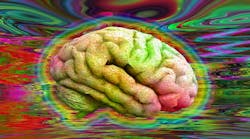For many (especially us math-haters), numbers are a source of stress. Unfortunately, as the coronavirus pandemic continues to surge, statistics have become part of our daily lives — and most of us are finding ourselves comparing and calculating, as we scroll through seemingly endless updates.
While health data — such as infection rates, mortality rates and death tolls — is instrumental when it comes to understanding and combating disease, the widespread sharing of these (sometimes inaccurate) numbers as they relate to COVID-19 has sparked controversy, confusion and political debate.
And on top of that, the constant flood of health data, combined with unrelenting feeds of bad news and strong social distancing measures, is creating the perfect storm for large-scale mental health struggles.
Various polls have recently attempted to gauge the impact of the coronavirus on psychological well-being, with some finding as much as 50 percent of those surveyed reporting a negative impact on their mental health.
Even prior to the outbreak of coronavirus, America was experiencing a mental health crisis. The data for mental health is far more sobering than that of COVID-19, which is hard to imagine at this point: Nearly 15 percent of those who are clinically depressed take their own life. Eight million people die each year due to mental illness. In terms of “infection rates,” one in five U.S. adults experience mental illness each year.
Mental health treatment is a therapeutic market where pharma has, in many cases, run out of answers. But as you will read in this month’s cover story, some pharma companies have turned to a seemingly unlikely source — conducting clinical trials on a range of compounds derived from traditional “party drugs” including LSD, psilocybin (found in “magic mushrooms”), MDMA (found in ecstasy) and ketamine (known on the street as “Special K”).
After being pushed to the back of research shelves in the ‘60s, psychedelics are once again being explored for their potential to treat an ever-growing population of patients with depression, anxiety, PTSD and ADHD. In 2018, the FDA granted breakthrough therapy designation to a psilocybin therapy for treatment-resistant depression being developed by COMPASS Pathways. Last year, the FDA approved J&J’s controversial Spravato, an esketamine nasal spray, also for patients with treatment-resistant depression.
As many psychological disorders thrive on social isolation, fear, and disruption of routine, the current pandemic and its appropriate restrictions could prove especially taxing on the world’s mental health. While it will likely be awhile before psychedelic treatments hit the scene — and they will have some very real obstacles to contend with, including safety, efficacy and distribution — the therapeutic potential is certainly there.
For the millions who already struggle and the countless more who may come to struggle with mental health, it’s encouraging to see that the pharma industry is investing time and resources into out-of-the-box treatment options.
Our world has been forever changed by COVID-19. In this newly forged reality, problem-solving is an important skill. In pharma and far beyond, we are finding that there is often more than one solution to a problem — and sometimes altering our mindset can help us see things more clearly.
About the Author
Karen P. Langhauser
Chief Content Director, Pharma Manufacturing
Karen currently serves as Pharma Manufacturing's chief content director.
Now having dedicated her entire career to b2b journalism, Karen got her start writing for Food Manufacturing magazine. She made the decision to trade food for drugs in 2013, when she joined Putman Media as the digital content manager for Pharma Manufacturing, later taking the helm on the brand in 2016.
As an award-winning journalist with 20+ years experience writing in the manufacturing space, Karen passionately believes that b2b content does not have to suck. As the content director, her ongoing mission has been to keep Pharma Manufacturing's editorial look, tone and content fresh and accessible.
Karen graduated with honors from Bucknell University, where she majored in English and played Division 1 softball for the Bison. Happily living in NJ's famed Asbury Park, Karen is a retired Garden State Rollergirl, known to the roller derby community as the 'Predator-in-Chief.'
